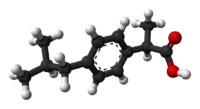
Photo from wikipedia
Background: Many studies have identified the important role of 8-isoprostane (8-iso-PGF2α) in pulmonary diseases. However, the role of 8-iso-PGF2α in community-acquired pneumonia (CAP) remains unclear. Therefore, the main goal was… Click to show full abstract
Background: Many studies have identified the important role of 8-isoprostane (8-iso-PGF2α) in pulmonary diseases. However, the role of 8-iso-PGF2α in community-acquired pneumonia (CAP) remains unclear. Therefore, the main goal was to investigate the correlations of serum 8-iso-PGF2α with the severity and prognosis in CAP patients through a hospital-based retrospective cohort study. Methods: All 220 patients with CAP were enrolled. Demographic information and clinical data were collected. Levels of 8-iso-PGF2α and inflammatory cytokines were detected in serum using ELISA. Results: The levels of 8-iso-PGF2α were gradually increased in parallel with the CAP severity scores. Univariate and multivariate logistic regression analyses revealed a positive association between serum 8-iso-PGF2α and the CAP severity scores. Additionally, serum 8-iso-PGF2α levels were positively correlated with circulating inflammatory cytokines (CRP and TNFα). Serum 8-iso-PGF2α levels were increased in the patients with a longer hospital stay than those with a shorter hospital stay. Additionally, 20 patients died after hospitalization. Dead patients presented a higher serum 8-iso-PGF2α than surviving patients. A subsequent survival analysis revealed that higher serum 8-iso-PGF2α levels positively correlated with the risk of death in patients with CAP. Conclusions: Serum 8-iso-PGF2α levels on admission are positively associated with the severity of CAP patients. Elevated serum 8-iso-PGF2α on admission prolongs hospital stay and increases the risk of death in patients with CAP, indicating that 8-iso-PGF2α may be involved in the progression of CAP and serve as an early serum prognostic biomarker for CAP.